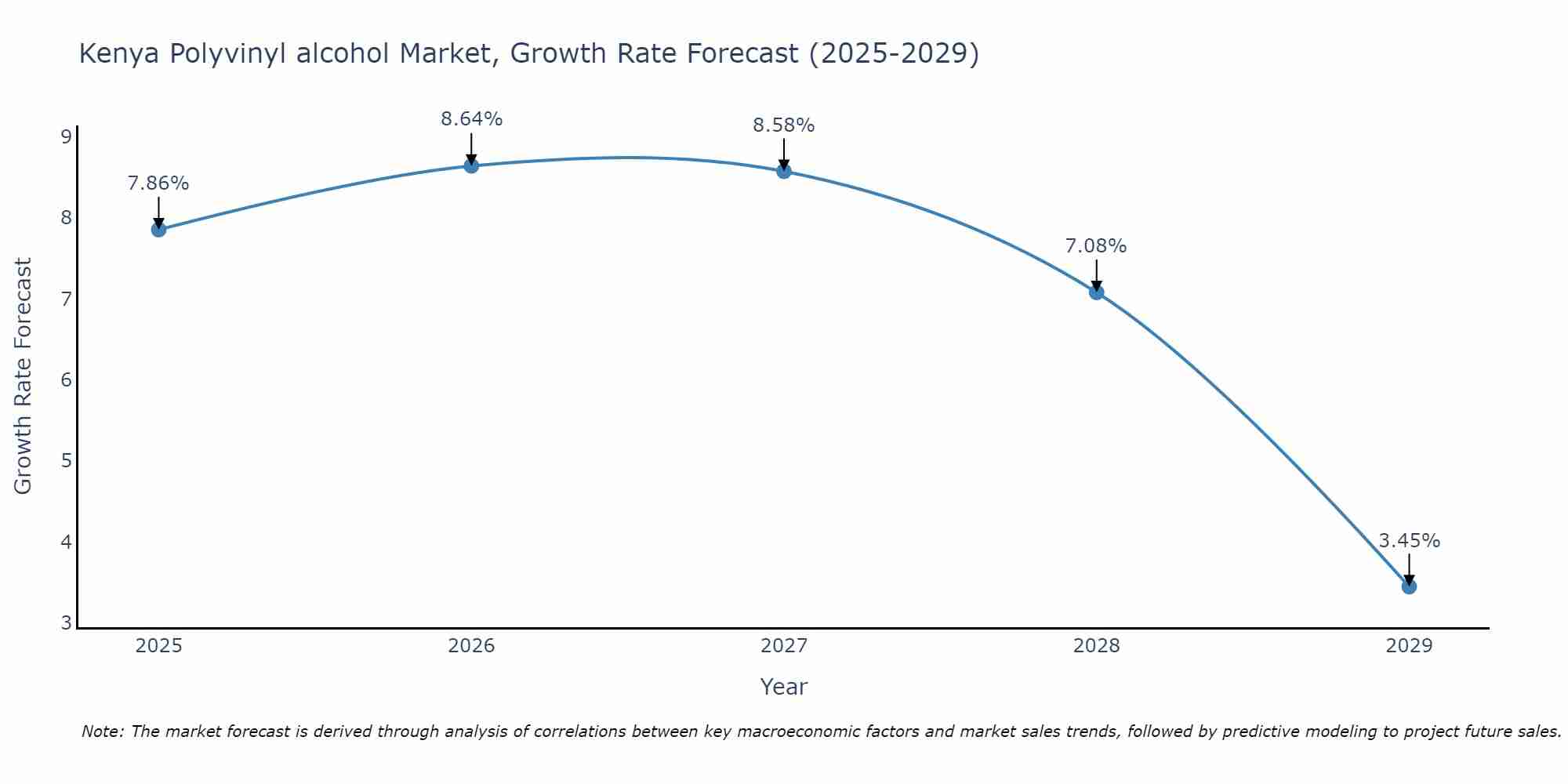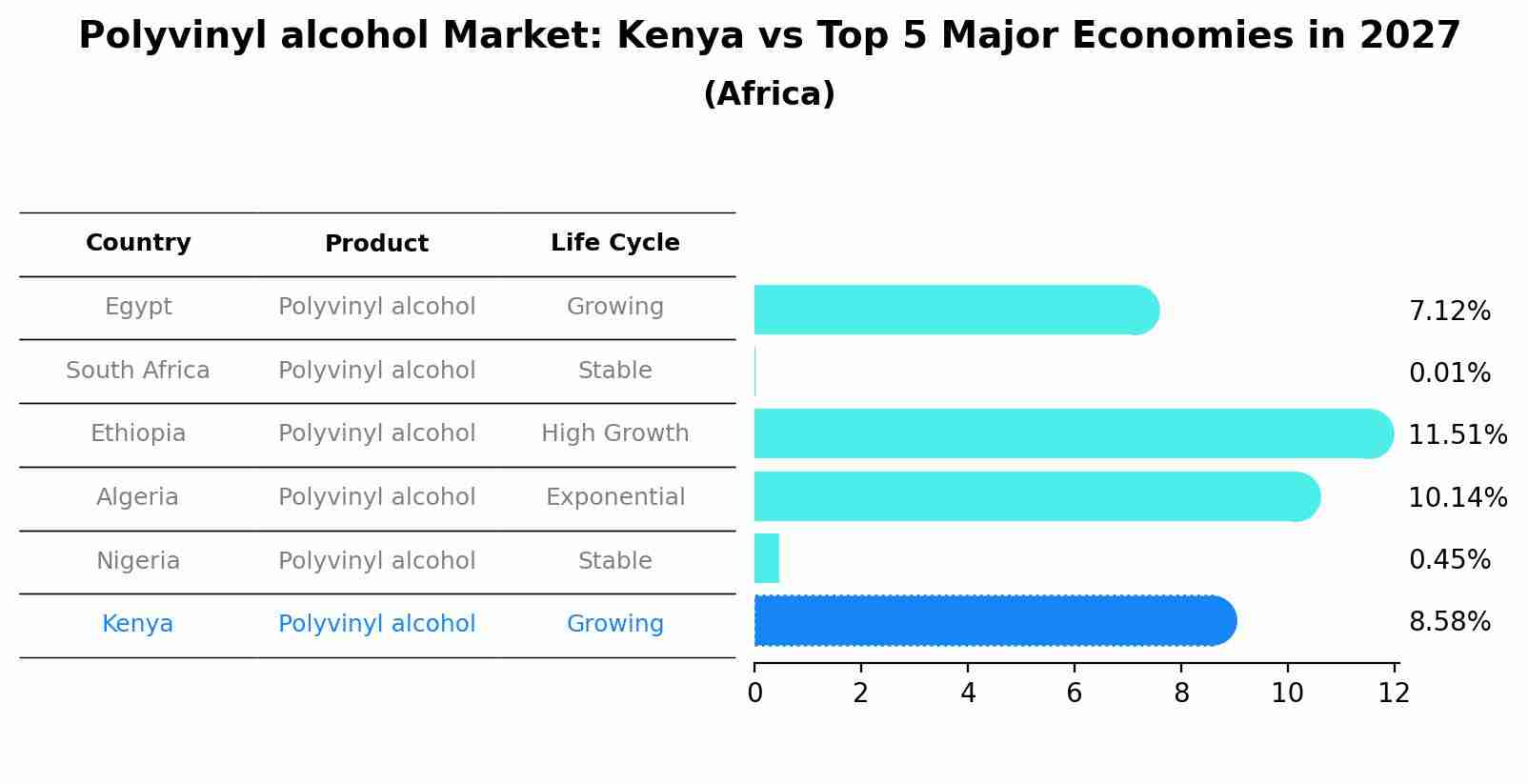Kenya Polyvinyl alcohol Market Outlook | Forecast, COVID-19 IMPACT, Growth, Trends, Value, Size, Industry, Companies, Share, Analysis & Revenue
| Product Code: ETC092109 | Publication Date: Jun 2021 | Updated Date: Jun 2025 | Product Type: Report | |
| Publisher: 6Wresearch | Author: Bhawna Singh | No. of Pages: 70 | No. of Figures: 35 | No. of Tables: 5 |
Kenya Polyvinyl alcohol Market Size Growth Rate
The Kenya Polyvinyl alcohol Market is projected to witness mixed growth rate patterns during 2025 to 2029. Growth accelerates to 8.64% in 2026, following an initial rate of 7.86%, before easing to 3.45% at the end of the period.

Polyvinyl alcohol Market: Kenya vs Top 5 Major Economies in 2027 (Africa)
The Polyvinyl alcohol market in Kenya is projected to grow at a growing growth rate of 8.58% by 2027, highlighting the country's increasing focus on advanced technologies within the Africa region, where Egypt holds the dominant position, followed closely by South Africa, Ethiopia, Algeria and Nigeria, shaping overall regional demand.

Kenya Polyvinyl alcohol Market Overview
The Kenya Polyvinyl alcohol (PVA) market is experiencing steady growth driven by various industries such as textiles, construction, packaging, and electronics. PVA is widely used in these sectors due to its excellent film-forming and adhesive properties, making it a versatile material for various applications. The increasing demand for PVA in packaging materials, adhesives, and textile sizing is fueling the market growth in Kenya. Additionally, the government`s initiatives to promote industrial development and foreign investments are further boosting the PVA market in the country. With a focus on product innovation and sustainable practices, key players in the Kenya PVA market are striving to meet the evolving needs of consumers and maintain a competitive edge in the industry.
Kenya Polyvinyl alcohol Market Trends
The Kenya Polyvinyl alcohol (PVA) market is experiencing steady growth due to its wide range of applications in industries such as textiles, construction, packaging, and pharmaceuticals. One key trend in the market is the increasing demand for eco-friendly and sustainable PVA products, driven by growing environmental awareness among consumers and regulatory pressures to reduce carbon footprints. Manufacturers are focusing on developing bio-based and biodegradable PVA products to cater to this demand. Additionally, the construction industry in Kenya is witnessing a surge in infrastructure projects, leading to higher consumption of PVA in applications such as adhesives, coatings, and concrete additives. Overall, the Kenya PVA market is poised for continued growth, driven by these trends and the expanding industrial and construction sectors in the country.
Kenya Polyvinyl alcohol Market Challenges
In the Kenya Polyvinyl alcohol market, some of the key challenges faced include limited awareness and understanding of the product among end-users, resulting in slower adoption rates. Additionally, inconsistent quality of imported PVA products due to fluctuations in global supply chains and currency exchange rates pose a challenge for local manufacturers in maintaining product standards. Moreover, the lack of a well-established distribution network and infrastructure in certain regions of Kenya hinders the efficient supply of PVA products to potential customers. These challenges collectively impact the growth and competitiveness of the Kenya Polyvinyl alcohol market, requiring industry players to focus on improving product education, ensuring product quality, and investing in distribution networks to overcome these obstacles.
Kenya Polyvinyl alcohol Market Investment Opportunities
In the Kenya Polyvinyl alcohol market, there are several promising investment opportunities for both local and international investors. The demand for Polyvinyl alcohol (PVA) is steadily increasing in Kenya due to its wide range of applications in industries such as textiles, adhesives, construction, and packaging. Investing in PVA production facilities or distribution networks in Kenya could prove to be lucrative as the country continues to experience economic growth and industrial development. Additionally, there is potential for innovation and product development in the PVA market, creating opportunities for investors to capitalize on emerging trends and technologies. Overall, the Kenya Polyvinyl alcohol market presents a promising landscape for investors looking to tap into the country`s growing industrial sector and consumer demand for PVA products.
Kenya Polyvinyl alcohol Market Government Policy
The Kenyan government has implemented various policies to support the Polyvinyl alcohol (PVA) market in the country. These include initiatives to promote local manufacturing of PVA, such as providing tax incentives and subsidies to domestic producers. Additionally, the government has focused on increasing research and development efforts to enhance the quality and competitiveness of locally produced PVA products. Furthermore, there are regulations in place to ensure environmental sustainability in the production and usage of PVA, aligning with the government`s commitment to environmental protection. Overall, these policies aim to boost the growth of the PVA market in Kenya, create employment opportunities, and contribute to the country`s economic development.
Kenya Polyvinyl alcohol Market Future Outlook
The Kenya Polyvinyl alcohol (PVA) market is poised for steady growth in the coming years. Factors driving this growth include the increasing demand for PVA in various industries such as packaging, textiles, construction, and pharmaceuticals. Additionally, the government`s focus on infrastructure development and favorable investment climate are expected to further boost the market. With rising disposable income and changing consumer preferences towards eco-friendly products, there is a growing trend towards the adoption of PVA-based products. Innovations in PVA technology and increasing awareness about its benefits are also likely to contribute to the market expansion. Overall, the Kenya PVA market is projected to experience a positive outlook with opportunities for market players to capitalize on the growing demand and expand their presence in the region.
Key Highlights of the Report:
- Kenya Polyvinyl alcohol Market Outlook
- Market Size of Kenya Polyvinyl alcohol Market, 2021
- Forecast of Kenya Polyvinyl alcohol Market, 2027
- Historical Data and Forecast of Kenya Polyvinyl alcohol Revenues & Volume for the Period 2018 - 2027
- Kenya Polyvinyl alcohol Market Trend Evolution
- Kenya Polyvinyl alcohol Market Drivers and Challenges
- Kenya Polyvinyl alcohol Price Trends
- Kenya Polyvinyl alcohol Porter's Five Forces
- Kenya Polyvinyl alcohol Industry Life Cycle
- Historical Data and Forecast of Kenya Polyvinyl alcohol Market Revenues & Volume By Grade for the Period 2018 - 2027
- Historical Data and Forecast of Kenya Polyvinyl alcohol Market Revenues & Volume By Partially Hydrolyzed for the Period 2018 - 2027
- Historical Data and Forecast of Kenya Polyvinyl alcohol Market Revenues & Volume By Fully Hydrolyzed for the Period 2018 - 2027
- Historical Data and Forecast of Kenya Polyvinyl alcohol Market Revenues & Volume By End-use Industry for the Period 2018 - 2027
- Historical Data and Forecast of Kenya Polyvinyl alcohol Market Revenues & Volume By Food Packaging for the Period 2018 - 2027
- Historical Data and Forecast of Kenya Polyvinyl alcohol Market Revenues & Volume By Textile for the Period 2018 - 2027
- Historical Data and Forecast of Kenya Polyvinyl alcohol Market Revenues & Volume By Paper for the Period 2018 - 2027
- Historical Data and Forecast of Kenya Polyvinyl alcohol Market Revenues & Volume By Medical for the Period 2018 - 2027
- Historical Data and Forecast of Kenya Polyvinyl alcohol Market Revenues & Volume By Construction for the Period 2018 - 2027
- Historical Data and Forecast of Kenya Polyvinyl alcohol Market Revenues & Volume By Electronics for the Period 2018 - 2027
- Kenya Polyvinyl alcohol Import Export Trade Statistics
- Market Opportunity Assessment By Grade
- Market Opportunity Assessment By End-use Industry
- Kenya Polyvinyl alcohol Top Companies Market Share
- Kenya Polyvinyl alcohol Competitive Benchmarking By Technical and Operational Parameters
- Kenya Polyvinyl alcohol Company Profiles
- Kenya Polyvinyl alcohol Key Strategic Recommendations
Frequently Asked Questions About the Market Study (FAQs):
- Single User License$ 1,995
- Department License$ 2,400
- Site License$ 3,120
- Global License$ 3,795
Search
Related Reports
- Australia IT Asset Disposal Market (2025-2031) | Strategy, Consumer Insights, Analysis, Investment Trends, Opportunities, Growth, Size, Share, Industry, Revenue, Segments, Value, Segmentation, Supply, Forecast, Restraints, Outlook, Competition, Drivers, Trends, Demand, Pricing Analysis, Competitive, Strategic Insights, Companies, Challenges
- UAE Building Thermal Insulation Market Outlook (2025-2031) | Revenue, Companies, Share, Trends, Growth, Size, Forecast, Industry, Analysis & Value
- Portugal Electronic Document Management Market (2025-2031) | Strategy, Consumer Insights, Analysis, Investment Trends, Opportunities, Growth, Size, Share, Industry, Revenue, Segments, Value, Segmentation, Supply, Forecast, Restraints, Outlook, Competition, Drivers, Trends, Demand, Pricing Analysis, Competitive, Strategic Insights, Companies, Challenges
- France Electronic Document Management Market (2025-2031) | Strategy, Consumer Insights, Analysis, Investment Trends, Opportunities, Growth, Size, Share, Industry, Revenue, Segments, Value, Segmentation, Supply, Forecast, Restraints, Outlook, Competition, Drivers, Trends, Demand, Pricing Analysis, Competitive, Strategic Insights, Companies, Challenges
- Portugal Occupational Health & Safety Services Market (2025-2031) | Strategy, Consumer Insights, Analysis, Investment Trends, Opportunities, Growth, Size, Share, Industry, Revenue, Segments, Value, Segmentation, Supply, Forecast, Restraints, Outlook, Competition, Drivers, Trends, Demand, Pricing Analysis, Competitive, Strategic Insights, Companies, Challenges
- Netherlands Occupational Health and Safety Services Market (2025-2031) | Strategy, Consumer Insights, Analysis, Investment Trends, Opportunities, Growth, Size, Share, Industry, Revenue, Segments, Value, Segmentation, Supply, Forecast, Restraints, Outlook, Competition, Drivers, Trends, Demand, Pricing Analysis, Competitive, Strategic Insights, Companies, Challenges
- Belgium and Luxembourg Facility Management Market (2025-2031) | Strategy, Consumer Insights, Analysis, Investment Trends, Opportunities, Growth, Size, Share, Industry, Revenue, Segments, Value, Segmentation, Supply, Forecast, Restraints, Outlook, Competition, Drivers, Trends, Demand, Pricing Analysis, Competitive, Strategic Insights, Companies, Challenges
- Russia Women Intimate Apparel Market (2025-2031) | Strategy, Consumer Insights, Analysis, Investment Trends, Opportunities, Growth, Size, Share, Industry, Revenue, Segments, Value, Segmentation, Supply, Forecast, Restraints, Outlook, Competition, Drivers, Trends, Demand, Pricing Analysis, Competitive, Strategic Insights, Companies, Challenges
- Africa Chocolate Market (2025-2031) | Size, Share, Trends, Growth, Revenue, Analysis, Forecast, industry & Outlook
- Global Hydroxychloroquine And Chloroquine Market (2025-2031) | Industry, Trends, Size, Outlook, Growth, Value, Companies, Revenue, Analysis, Share, Forecast
Industry Events and Analyst Meet
Our Clients
Whitepaper
- Middle East & Africa Commercial Security Market Click here to view more.
- Middle East & Africa Fire Safety Systems & Equipment Market Click here to view more.
- GCC Drone Market Click here to view more.
- Middle East Lighting Fixture Market Click here to view more.
- GCC Physical & Perimeter Security Market Click here to view more.
6WResearch In News
- Doha a strategic location for EV manufacturing hub: IPA Qatar
- Demand for luxury TVs surging in the GCC, says Samsung
- Empowering Growth: The Thriving Journey of Bangladesh’s Cable Industry
- Demand for luxury TVs surging in the GCC, says Samsung
- Video call with a traditional healer? Once unthinkable, it’s now common in South Africa
- Intelligent Buildings To Smooth GCC’s Path To Net Zero













